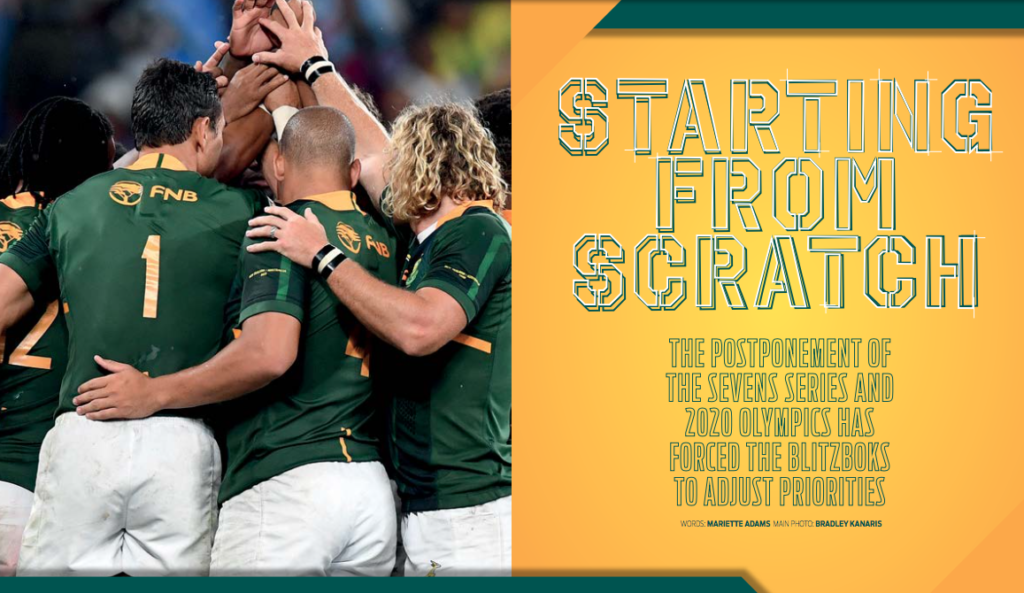The postponement of the Sevens Series and 2020 Olympics has forced the Blitzboks to adjust priorities, writes MARIETTE ADAMS in the latest SA Rugby magazine.
NEW MAG: What’s in our latest issue?
The Blitzboks looked poised for a decent medal run at the 2020 Olympic Games in Tokyo. But not even the celebrated Games could withstand the force of the coronavirus. The 12-month postponement of the showpiece event was inevitable and rarely has a gold medal felt as trivial as it did when you consider the global impact of this pandemic.
For the Springbok Sevens team, there was much at stake as they were preparing to chase a first Olympic gold medal. There was also a rare chance for redemption after their heartbreaking third-place finish at the 2016 Games in Rio de Janeiro, and the possibility of a golden send-off for a few of the Blitzboks’ most loyal and long-serving members. Like everything else, those storylines will have to wait.
‘It’s obviously a disappointment. We felt we had a good plan in place for the season in terms of managing players and the way we tested the different combinations and new players,’ coach Neil Powell tells SA Rugby magazine.
‘We were so excited about going to the Olympics. In Rio in 2016, we fell short. We felt like we should’ve at least played in the final, so this was our chance to make it right. The nice thing about the whole squad is that 80% of the guys who played in Rio were again available for Tokyo. It’s not to say we would’ve selected them but at least they were available and we would have had players with Olympic experience. Now I don’t know who will be available.’
The process of constructing a 12-man Olympic squad isn’t top of the mind right now, though. With the World Rugby Sevens Series season also suspended and uncertainty about when it will resume, Powell is worried about a congested schedule in the lead-up to the Games next July that could take a physical toll on his squad.
‘With those final four tournaments rescheduled for September and October, the next season is going to be a long one. We’d play the Singapore, Hong Kong, Paris and London tournaments, and then have no real break before we head to the Dubai Sevens, which kicks off the 2020-21 campaign.
‘Effectively, we’ll have to compete in 14 tournaments plus the Olympics in one season. We’ll have to manage the system, players and even management well to ensure we arrive in Tokyo in a strong mental and physical state. We’ll target at least two tours in the regular season where we will give other players in the sevens system an opportunity and send the academy staff to oversee those tours.’
Another painful truth when it comes to elite sport is an athlete’s age. The rescheduling of the Olympics Games could prove to be a blessing for some, but a bridge too far for others.
‘Once you get past a certain age, you start to go downhill. There might be one or two guys who are feeling it more than the others,’ Powell says. ‘For instance, Cecil Afrika and Chris Dry, who are reaching the end of their careers, are more disappointed because they soldiered on to be in contention for Olympic selection in 2020. This turn of events might mean they miss the Games next year because perhaps they can’t push through another gruelling World Series just to make it to Tokyo.
‘It’s the same for players from other teams on the circuit, too. I know Phil Burgess and Dan Norton of England, Tim Mikkelson, Scott Curry and Sam Dickson from New Zealand and Harry Jones from Canada hoped they’d make it to Japan, but now that the Games are a year later they might not be in contention. It’s sad but an extra year could cause serious harm to their bodies.’
In March, the rugby season had been put on ice and the Olympic torch had been halted, and by early April South Africa remained in lockdown. Powell is itching to redraw the preparation plans.
‘We are going to have to plan thoroughly to be successful over the next few months. We still want to get those fifteens players like Ruhan Nel, Rosko Specman, Dylan Sage and Seabelo Senatla back in the system, so we are going to have to talk to them too. But again, we can’t do anything until this health crisis is completely over and we know exactly when all the tournaments, like the World Series and Super Rugby, will be completed. We will see how it plays out in terms of the lockdown and how long it will be until we can reassemble and start our planning from scratch to make sure we are ready for the Olympics next year.’
Amid all the uncertainty and despite a long list of hurdles and complications, one thing is clear: Powell will get the Blitzboks in the best possible condition for the Olympics, albeit a year later than planned, and with a different squad makeup than he had in mind.
*This article first appeared in the May issue of SA Rugby magazine, which is now on sale.





